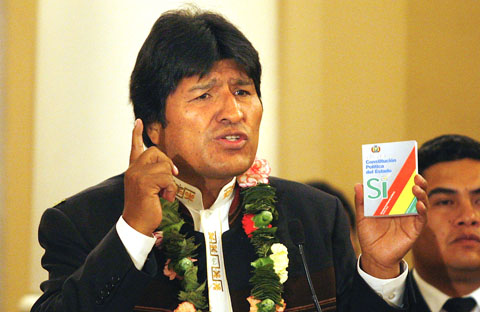Bolivian President Evo Morales on Thursday called a referendum for Dec. 7 to rewrite his country’s Constitution, sharpening a political struggle with rebel governors opposed to his sweeping socialist reforms.
“This is to deepen democracy,” he said, announcing from his presidential palace in La Paz a decree setting up the plebiscite.
The new referendum — which had been widely expected since Morales won two-thirds support in an Aug. 10 recall referendum confirming his mandate — is “to consolidate the process of change,” he said.

PHOTO: AP
Regional authorities in the eastern state of Santa Cruz, an opposition bastion, immediately challenged the legality of the decree.
“We reject the policies that the government wants to impose through a decree,” they said in a statement.
They stressed that the Aug. 10 recall referendum had also solidly confirmed the mandates of several of the opposition governors ranged against Morales.
The rebel governors have already said they will not permit any such referendum to be held in their states.
The president, who became the first indigenous leader of Bolivia in 2006, is locked in a worsening power struggle with the governors of five of the country’s nine states who are blocking his attempts to redistribute more land and national wealth to the indigenous majority.
The governors of the states of Santa Cruz, Beni, Tarija and Chuquisaca — all with populations of mostly European descent and with indigenous minorities — are demanding more control over revenues from gas fields in their territories that are vital to the economy of Bolivia, South America’s poorest nation.
Morales has been prevented in recent weeks by protesters in those states from landing his aircraft. On Wednesday, he was forced to touch down over the border in Brazil after his helicopter ran low on fuel over opposition territory.
The long crisis had stymied Morales’ forceful efforts to redraft the Constitution to enshrine his reforms, and he had hoped the Aug. 10 referendum would give him the upper hand.
Instead, the results secured his mandate and those of his chief foes. That briefly pushed them together for an attempt at dialogue to find a solution, but the talks failed.
The opposition governors quickly ratcheted up anti-Morales demonstrations, prompting the president last weekend to order troops to guard gas and oil installations in the east.
The threat of the confrontation turning into widespread unrest is real.
A few violent incidents have already erupted over the past 18 months between pro- and anti-government protesters, resulting in half a dozen deaths.
Roads in some parts of eastern Bolivia are being blocked by anti-Morales protesters, and local authorities in those areas say they are “on a war-footing.”

A new online voting system aimed at boosting turnout among the Philippines’ millions of overseas workers ahead of Monday’s mid-term elections has been marked by confusion and fears of disenfranchisement. Thousands of overseas Filipino workers have already cast their ballots in the race dominated by a bitter feud between President Ferdinand Marcos Jr and his impeached vice president, Sara Duterte. While official turnout figures are not yet publicly available, data from the Philippine Commission on Elections (COMELEC) showed that at least 134,000 of the 1.22 million registered overseas voters have signed up for the new online system, which opened on April 13. However,

ENTERTAINMENT: Rio officials have a history of organizing massive concerts on Copacabana Beach, with Madonna’s show drawing about 1.6 million fans last year Lady Gaga on Saturday night gave a free concert in front of 2 million fans who poured onto Copacabana Beach in Rio de Janeiro for the biggest show of her career. “Tonight, we’re making history... Thank you for making history with me,” Lady Gaga told a screaming crowd. The Mother Monster, as she is known, started the show at about 10:10pm local time with her 2011 song Bloody Mary. Cries of joy rose from the tightly packed fans who sang and danced shoulder-to-shoulder on the vast stretch of sand. Concert organizers said 2.1 million people attended the show. Lady Gaga

CONFLICTING REPORTS: Beijing said it was ‘not familiar with the matter’ when asked if Chinese jets were used in the conflict, after Pakistan’s foreign minister said they were The Pakistan Army yesterday said it shot down 25 Indian drones, a day after the worst violence between the nuclear-armed rivals in two decades. Pakistani Prime Minister Shehbaz Sharif vowed to retaliate after India launched deadly missile strikes on Wednesday morning, escalating days of gunfire along their border. At least 45 deaths were reported from both sides following Wednesday’s violence, including children. Pakistan’s military said in a statement yesterday that it had “so far shot down 25 Israeli-made Harop drones” at multiple location across the country. “Last night, India showed another act of aggression by sending drones to multiple locations,” Pakistan military spokesman Ahmed

SUPPORT: The Australian prime minister promised to back Kyiv against Russia’s invasion, saying: ‘That’s my government’s position. It was yesterday. It still is’ Left-leaning Australian Prime Minister Anthony Albanese yesterday basked in his landslide election win, promising a “disciplined, orderly” government to confront cost-of-living pain and tariff turmoil. People clapped as the 62-year-old and his fiancee, Jodie Haydon, who visited his old inner Sydney haunt, Cafe Italia, surrounded by a crowd of jostling photographers and journalists. Albanese’s Labor Party is on course to win at least 83 seats in the 150-member parliament, partial results showed. Opposition leader Peter Dutton’s conservative Liberal-National coalition had just 38 seats, and other parties 12. Another 17 seats were still in doubt. “We will be a disciplined, orderly